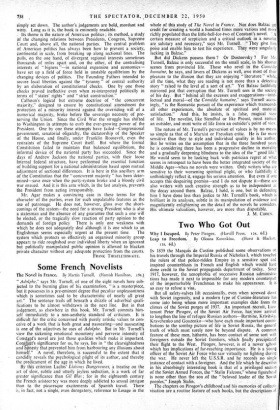Some French Novelists
The Novel in France. By Martin Turnell. (Hamish Hamilton. ,z8s.) " Adolphe," says Mr. Turnell, of one of the eight novels here sub- jected to the burning glass of his examination, "is a masterpiece, but it possesses in a pre-eminent degree that peculiar unpleasantness which is sometimes said to be characteristic of nearly all great art." The sentence trails off beneath a drizzle of adverbial quali- fications to be almost withdrawn in the next line. But in that judgement, as elsewhere in this book, Mr. Turnell commits him- self immediately to a non-aesthetic standard of criticism. It is difficult for the critic concerned with purely artistic values to con- ceive of a work that is both great and nauseating—and nauseating is one of the adjectives he uses of Adolphe. But in Mr. Turnell's view the sickening emotional monotony and perverse intensity of ConsWt's novel are just those qualities 'which make it important. ,Con_Lailt's significance for us, he says, lies in "the clearsightedness and Onesty that prevented him from harbouring any illusions about himself." A novel, therefore, is successful to the extent that it candidly reveals the psychological plight of its author, and thereby the predicament of the age in which he lived.
By this criterion Laclos' Liaisons Dangereuses, a treatise on the art of slow, subtle and utterly joyless seduction, is a work of far greater significance than Gil Bias; for in the eighteenth century the French aristocr5cy was more deeply addicted to sexual intrigue than to the picaresque excitements of Spanish travel. There ' is, in fact, not a single, even derogatory, reference to Lesage in the whole of this study of The Novel in France. Nor does Balz4c get credit for creating a world a hundred times more various and more richly populated than the little-hell-for-two of Constant's novel. 'A certain measure of scepticism and a critical outlook in a novelist are salutary and necessary," says Mr. Turnell. "They give him poise and enable him to test his experience. They were singularly lacking in Balzac." But did Dickens possess them ? Or Dostoevsky ? For Mr. Turnell, Balzac is only successful on the small scale, in his shone scenes from provincial life. Those who revel in the Comedi humaine, he says, and lovers of Dickens as well, owe most of their pleasure to the illusion that they are enjoying " literature " while all the time, what they are reading is not more than a detective story "raised to the level of a sort of art." Yet Balzac faithful! mirrored just that corruption that Mr. Turnell. sees in the society of his day. - But "behind all the excesses and exaggerations—intel lectual and moral—of the Comedie humaine," says Turnell accus- ingly, "is the Romantic pursuit of the experience which transcend all other experiences, the absolute of spiritual and material satisfaction." And this, he 'insists, is a false, magical view of life. The novelist, like Stendhal or like Proust, must remain an outsider, and must write of life from an outsider's point of view.
The nature of Mr. Turnell's perversion of values is by no mean so simple as that of a Marxist or Freudian critic. He is far more sensitive than they to style and individual quality in his author. But he writes on the assumption that in the three hundred year he is considering there has been a progressive decline in morality and a gradually deepening blindness to the idea of the "good life.' He would seem to be looking back with patrician regret at who seems in retrospect to have been the better integrated society of the Middle Ages—when no novels were written. Only writers who are sensitive to their worsening spiritual plight, or who faithfully if unthinkingly reflect it, engage his serious attention. But even if on accepts this despairing premiss—and I do not dispute it—there are also writers with such creative strength as to be independent of the decay around them. Balzac, I hold, is one, but in defending him I have done less than justice to Mr. Turnell's book, which is brilliant in its analyses, subtle in its manipulation of evidence an magnificently enlightening on the detail of the novels he considers His ultimate ValuitiiMS, however, are more than diSPutable.
J. M. COHEN.


































 Previous page
Previous page